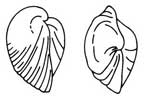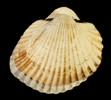| Term | Definition |
| ACCESSORY VALVE | See: ACCESSORY PLATE. | |
| BIVALVE | Typically, a mollusc in the class Bivalvia, with two shelly valves, such as an oyster or scallop; = CLAM. Additionally, other bivalved molluscs exist such as the Paleozoic ROSTROCONCHS, and the Recent bivalved gastropods of the family Juliidae; other phyla, such as the Brachiopoda, are not strictly referred to as "bivalves"; see: LAMELLIBRANCH; see also: UNIVALVE; MUSSEL. | |
| BIVALVE, ATTACHED | Bivalves which have cemented themselves to a substrate, e.g., species in genera such as Crassostrea, Ostrea, Spondylus, Chama, Mytilus; see also: ATTACHED; BORING BIVALVES; CEMENTATION; INFERIOR VALVE. | |
| BIVALVE, BORING | Bivalves with dissolve their substrate (rock or wood), forming burrows into which they exist and grow, e.g. SHIPWORMS, Teredo spp.; see also: ATTACHED BIVALVE. | |
| BIVALVE, BROODING | A bivalve which undergoes internal fertilization, and sheds its young as miniature adults (commonly) or sometimes as larvae (less commonly) after having brooded or incubated them within the MANTLE CAVITY of the parent, e.g. Bornia spp., Parastarte spp., Lyonsia spp. | |
| BIVALVED GASTROPOD | A GASTROPOD (e.g., Julia spp. [Ascoglossa: Juliidae]) with two VALVES, like a clam. | |
| EQUIVALVE |
In bivalves, having each VALVE equal in size and shape; see also: EQUILATERAL; INEQUIVALVE. See other bivalve shapes. |
|

|
| FREE VALVE | In attached bivalves, the valve which is not attached to the substrate; = UPPER VALVE. | |
| HEAD VALVE |
The first of (typically) eight valves of a CHITON. See also: TAIL VALVE; MEDIAN VALVE. See illustration: Composite Chiton. |
|
| INEQUIVALVE |
In bivalves, having one valve that is larger (as in the genera Anadara and Corbula) or more convex (as in the genus Pecten) than the other valve. See also: EQUIVALVE; MARGIN, DISCORDANT. See other bivalve shapes. Photo: Anadara brasiliana (Lamarck, 1819) |
|
 
|
| INFERIOR VALVE | That valve (of "attached" bivalves) which is attached to the substrate; = ATTACHED VALVE; = LOWER VALVE. | |
| LEFT VALVE (abbrev: LV) |
Valve of a bivalve lying on left-hand side when shell is placed with anterior end pointing away from observer, and with COMMISSURE vertical, the hinge being uppermost; see also: RIGHT VALVE. Visit Let's Talk Seashells for how to distinguish between right and left valves. |
|
| LOWER VALVE | In attached bivalves, the valve which is attached to the substrate; = ATTACHED VALVE; = INFERIOR VALVE. See also: UPPER VALVE. | |
| MEDIAN VALVE INTERMEDIATE VALVE |
The 2nd through 7th of (typically) eight valves of a CHITON. See also: TAIL VALVE; HEAD VALVE See illustration: Composite Chiton. |
|
| RIGHT VALVE (abbrev: RV) |
That valve of a bivalve lying on the observer's right-hand side when the shell is placed with anterior end pointing away from the observer, and with COMMISSURE vertical, the hinge being uppermost; see also: LEFT VALVE. Visit Let's Talk Seashells for how to distinguish between right and left valves. | |
| TAIL VALVE |
The first of (typically) eight valves of a CHITON. See also: HEAD VALVE; MEDIAN VALVE. See illustration: Composite Chiton. |
|
| UNIVALVE | A shell consisting of a single piece, as in most GASTROPODS; see also: BIVALVE. | |
| UPPER VALVE | In attached bivalves, the valve which is not attached to the substrate; = FREE VALVE. See also: LOWER VALVE. | |
| VALVE | One of the shelly halves of a clam (or BIVALVE) shell, or the single shell of a GASTROPOD (UNIVALVE), or one of the 8 (typically) shelly plates of a CHITON. See illustration: Composite Chiton. | |
| VALVE CALLUS | Same as: INSERTION PLATE. | |
| VALVE, ATTACHED | In ATTACHED BIVALVES, the valve which is attached to the substrate; = INFERIOR VALVE; = LOWER VALVE. See also: ATTACHED; UPPER VALVE. | |
| VALVE, CENTRAL AREA | [need definition]. In CHITONS, … See illustration: Composite Chiton. | |
| VALVE, LATERAL AREA | [need definition]. In CHITONS, … See illustration: Composite Chiton. | |